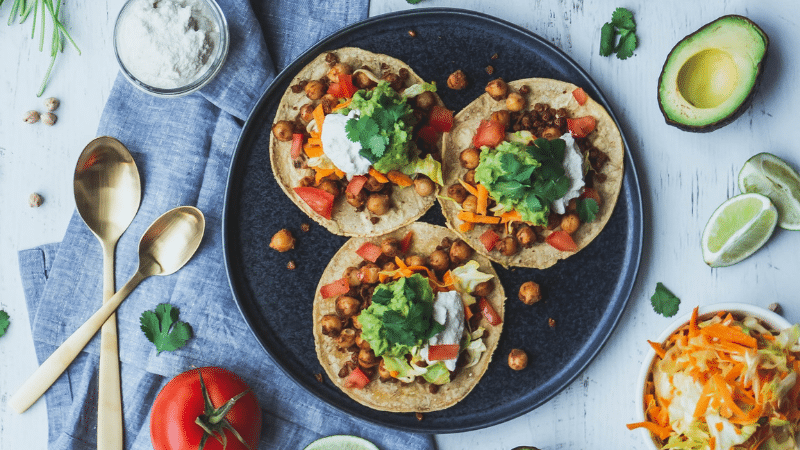25 Interesting Vegan Statistics and Facts for 2024

Before we start digging deeper into vegan statistics, it’s important to establish what being a vegan implies. To put it shortly, a vegan is someone who doesn’t eat animal products. So how does the vegan lifestyle work? Fortunately, we’ve compiled the latest and most essential veganism statistics worldwide.
If you’re interested in new ways to do something good for your health, this article may be of use to you. Let’s begin.
Top 10 Veganism Statistics for 2024
- As of January 2021, the total number of vegans across the world is around 79 million.
- The percentage of vegans in the US went up to 3% in 2018.
- One vegan spares the lives of 30 animals per year.
- Between 20% and 37% of the population in India are vegans.
- Vegan diets can reduce water use up to 50%.
- The sales of plant-based milk went up 9.4% in 2017.
- If everyone went vegan, the world’s emissions related to food would drop 70% by 2050.
- Only 1% of Australians are vegan.
- The global vegan women’s fashion market was worth $396.9 billion in 2019.
- Food production is responsible for 26% of all greenhouse gas emissions.
Global Vegan Trend Statistics
Many people choose to go vegan due to health, environmental, or ethical reasons. In the section below, you’ll find some interesting facts about being vegan, why veganism is a growing trend of late, how veganism impacts the environment, and much more. Let’s take a closer look.
1. A few years ago, there were only 1% of vegans in the world.
(VOU)
In a nutshell, over the last 3 or 4 years, the increase in the number of followers of the vegan lifestyle has been phenomenal. Today, the total percentage of vegans in the world—and all linked categories (including vegetarians), is close to 14% of the world population. Sounds impressive, right?
2. The 2018 US vegan statistics indicate that the percentage of vegans went up from 2% in 2012 to 3% in 2018.
(Gallup)
Veganism is on the rise across the US, with health and eco-conscious millennials as the driving force behind the rising vegan trends. The number of vegans in the US is growing fast. The same Gallup poll that brought back these numbers shows a somewhat surprising stagnation in the adoption of vegetarianism, with just 5% of the respondents declaring as vegetarians both in 2012 and in 2018.
3. The 2021 vegan statistics for the UK reveal that the number of vegans in the country increased from 150,000 in 2014, to 720,000 in 2020.
(VOU)
Just like in the US, the number of people who went vegan in the UK has quadrupled. The World Vegan Day is widely celebrated by the British since the UK is the country most interested in veganism. Nowadays, there are approximately 720,000 vegans in the UK, which translates to about 1.2% of the country’s total population.
4. Fascinating vegan fact: 20%–37% of the population in India are vegetarian.
(BBC)
India has the lowest percentage of meat-eaters in the world. In part, that is because of its religion, Hinduism. Hindus make up 80% of the country’s population, and while not all of them are vegetarian or vegan, those in higher social standing often are.
5. The vegan vs meat-eater statistics in Australia indicate that only 1% of the population is vegan.
(ABC News)
According to the data from the National Nutrition Survey and other studies, about 1% of Australians are vegan. If we take a look at the vegan facts and statistics for Australia, we can see that 89% of its residents declare as meat-eaters.
Vegan Food Market Statistics
There are non-profit organizations, like Veganuary, that encourage people to try going vegan and that collaborate with businesses to expand the offer of vegan food in shops and restaurants. Since the number of people who are following the vegan lifestyle is growing, the demand for plant-based products has changed the food market.
6. The statistics on vegans reveal that the UK was the nation with the highest number of new vegan food products launched in 2018.
(Mintel)
Every day, more and more Brits turn to plant-based meals. Unsurprisingly, the UK vegan-related new product development (NPD) is thriving. Until 2018, the country that launched the highest number of new vegan food products was Germany. Today, the number 1 spot belongs to the UK. In 2018, 16% of food products launched in the UK had no animal ingredients.
7. According to the vegan statistics for 2019, in the USA, the sale of plant-based foods has grown 11%.
(PBFA) (GFI)
The plant-based products in the US today are a $7 billion market. In line with that, the plant-based meat category alone is worth more than $1.4 billion. And what’s more, the most developed plant-derived product category is milk.
8. As a consequence of the vegan food trends, the sales of plant-based milk in the UK went up 9.4% in 2017.
(Mintel)
The Brits who strive to be healthier want to expand their comfort zones. In February 2018, the percentage of people in the UK drinking plant-based milk went up to 27% of those between the ages of 25 and 34. Instead of the regular dairy milk, they typically consumed nut milk, such as almond, soy, coconut, and rice milk.
9. Following the vegan trend, 9% of British diners would like more vegan options on the menu.
(Mintel)
The supermarkets and restaurants in Britain tend to promote more vegan options. Although 39% of the British diners claim that vegan meals are boring and 41% say they are overpriced, only 9% would like a menu with more vegan options. The small stores also offer more plant-based foods for anyone adhering to a vegan diet.
Vegan Facts and Myths
When new trends pop up, a lot of misinformation also comes along. Needles to say, there are a lot of misinterpreted vegan facts. There are many myths about veganism that should be challenged. Keep reading to find out the latest vegan facts for 2022.
10. Myth: Vegan diets don’t include enough protein or calcium.
(Medical News Today) (The Free Press Journal)
Some of the world’s top sports players and athletes are vegan. The vegan diet statistics indicate that you can build muscle while eating plant-based foods—just take a look at Serena Williams. In other words, there are some vegan foods that contain plenty of protein.
11. Myth: Vegan food is boring and bland.
(The Free Press Journal)
The vegan smart nutritional facts reveal that going vegan doesn’t mean you have to refrain from delicious food. You can have salads sprinkled with seeds, nuts, and delightful toppings, and smoothies prepared with plant-derived milk. With a little bit of experimenting and innovation, vegan meals can become your favorite food.
12. Myth: You can’t get B12 from a vegan diet.
(Medical News Today)
Veganism isn’t just a trend, it’s a lifestyle choice, and it requires commitment. Vegans can get rid of all animal products and replace them with vegan-friendly foods which are fortified with B12, such as cereals, tofu, non-dairy milk, and spreads. Of course, a number of high-quality B12 supplements are also available.
13. Myth: Only rich people can afford vegan food.
(The Free Press Journal)
Are you worried about your vegan diet cost? Make no mistake about it—locally and freshly produced vegan food is more affordable than you think. Products such as rice, grains, and potatoes are cheaper than meat and dairy. If you just do the math, it turns out that the cost of being vegan isn’t that high at all.
Vegan Environmental Statistics
Choosing the vegan lifestyle is one of the most efficient ways to reduce your environmental impact on the earth. You may wonder how, and it’s pretty obvious once you think about it. So let’s get down to it.
14. If everyone followed a vegan diet, the world’s emissions related to food would drop 70% by 2050.
(BBC Good Food)
Maybe you’re wondering how food manufacturing impacts the climate. One of the answers is the high environmental cost of industrialized animal farming. Meat and dairy production accounts for 14.5% of all greenhouse gas emissions made by people. That’s nearly identical to the exhaust emissions of every car, train, and aircraft on this planet.
15. Animal-based food production is responsible for significantly higher greenhouse gas (GHG) emissions than plant-based food production.
(Vegan Outreach)
As vegan environmental statistics reveal, animal agriculture is one of the biggest contributors to greenhouse gas emissions, water pollution, and air pollution. Across the world, the production of meat and dairy uses 83% of farmland and produces close to 60% of agriculture’s greenhouse gas emissions. Many studies have found that veganism has the greatest potential for minimizing greenhouse gas emissions.
16. The statistics on vegans also reveal that food production is responsible for 26% of all greenhouse gas emissions contributing to global warming.
(BBC) (ORA)
Animal products have worse effects on the environment than their plant alternatives. Although the environmental impact of different foods varies, animal products are responsible for 58% of food-related greenhouse gas emissions.
17. The vegan statistics for 2021 indicate that vegan diets use the least amount of water, and diet changes can reduce water use up to 50%.
(Vegan Outreach)
While millions of people on the planet don’t have access to clean drinking water, animal agriculture uses nearly a third of the drinking water available. Animals raised for food create a massive amount of groundwater pollution. Since a vegan diet requires less water than meat-eating diets, the consumption of vegan foods can benefit the environment.
Noteworthy Vegan Health Statistics
The number of people who are moving toward a vegan lifestyle due to health-related reasons increases daily. Going vegan not only helps us lose weight—potentially at a rate comparable to that achieved with the help of the best appetite suppressant products available, but also improves our health in many ways. Here are some health benefits of eating vegan.
18. Based on the choice of food, the statistics reveal there are five types of vegans in the world.
(Health Line)
Due to health reasons, not all vegans follow the same food regime. Therefore, there are many types of diets. Below you can find the descriptions of five different types of vegan lifestyles. Let’s take a closer look at them:
- Dietary vegans
- Whole-food vegans
- Junk-food vegans
- Raw-food vegans
- Low-fat, raw-food vegans
19. Eating 50 g of processed meat per day can increase the risk of colorectal polyps by 29%.
(Medical News Today) (Mayo Clinic)
A vegan diet can be very nutritious, minimize the risk of chronic diseases, and accelerate weight loss. It is low in saturated fats and rich in nutrients. Vegan food can boost heart health, protect against cancer, and reduce the risk of type 2 diabetes. Eating lots of vegetables and fruits provides a wide range of important vitamins and minerals.
20. Vegan cancer statistics show that 10 grams of daily fiber could lower the risk of colorectal cancer by 10%.
(WCRF) (Mayo Clinic)
Consuming plant foods is associated with lower cancer risk. Since vegans eat more plant foods than people who consume meat, they have a reduced risk of developing cancer. As a matter of fact, if we take a look at the vegan cancer rate, we can see that people on a vegan diet have the lowest overall cancer incidence when compared to those following other diets.
21. 14% of the world population follow a vegan diet because it ticks many of the boxes a healthy diet should.
(Vegan Friendly)
A diet rich in fiber is low in saturated fat, which is mainly found in animal products. If you take into account the facts about going vegan, you can improve your health by eating lots of whole grains and limiting foods and drinks that are high in sugar or salt. That can be a challenge, but it’ll be very useful for your well-being.
Vegan Fun Facts
Veganism is more popular than ever. If you are new to this lifestyle, the following section will help you to find out some interesting and weird vegan facts. Let’s dive in.
22. The UK’s fashion industry also tends to follow the vegan trend.
(Vegan Society) (Vogue Business)
There are some vegans who not only avoid meat but also don’t wear animal-derived materials. The available veganism facts indicate that, in 2019, the stock of vegan fashion products went up by 258% across the UK and US. The global vegan women’s fashion market was worth $396.9 billion in 2019. In a nutshell, 95% of the shoppers would appreciate more vegan-verified fashion.
23. The vegan facts for 2021 reveal that one vegan spares 30 animal lives a year.
(Challenge 22)
In the food industry, animals are abused and slaughtered. It’s estimated that 99% of all farmed animals live their whole lives confined in factory farms. More than 150 million farmed animals are killed each day. By going vegan, you would be protecting them.
24. The scientific facts about veganism reveal that 20% of Brits have been using fewer animal products since the start of the COVID-19 pandemic.
(Vegan Society)
2020 was a hard year for everyone. Our habits changed in many ways during the quarantine. The Vegan Society conducted research that focused on changing consumer habits during the coronavirus pandemic. The veganism statistics show that 20% of people in the UK eat less meat, while 12% say they’ve reduced their eggs and dairy intake. And in addition to that, 32% spend more time thinking about their impact on the planet.
25. The available vegan statistics reveal that many social justice activists throughout history have been vegan.
(Mercy for Animals)
Coretta Scott King, Rosa Parks, Mahatma Gandhi, Dolores Huerta, and countless more. All of them have been avoiding meat and exposing the abuse of animals. While fighting for social change, these activists were also animal justice warriors.
Final Thoughts
It’s always a good time to think about changing your eating habits. If this was an interesting read for you, you might even consider going vegan for a month. That would be an excellent opportunity to find out more about cooking and nutrition, and it could greatly boost your health.
FAQs
What percent of vegans return to meat?
When it comes to food, everyone has a different motivation. According to the available vegan facts, the health benefits of this diet can be impressive. Even so, it’s estimated that 84% of people who have adopted veganism at some point in their lives have gone back to eating meat. A bit less than 1 in 5 vegans maintain their diet.
Is it true that vegans are healthier?
The facts about veganism reveal that, in general, vegans are healthy. After all, veganism is the wellness industry’s money-spinner and many athletes’ latest choice for a reason. But beware, scientists warn there’s still much we don’t know about the potential cons of being veg
Is veganism more popular than vegetarianism?
The interest in the vegan lifestyle has become far more pronounced than interest in vegetarianism. The increased popularity of vegan diets is not surprising. It is plainly evidenced by the proliferation of vegan-based businesses and the rapidly growing number of vegan restaurants in metropolitan areas.
Which country has the most vegans?
By and large, veganism’s fame grows daily. Vegan stats show that the popularity of this lifestyle has increased a lot in the UK. It’s now the third year in a row that the UK has ranked as the most popular country worldwide for plant-based eating. On top of that, 3 of the top 10 cities in the world (in terms of plant-based diets popularity) are in the UK.
How much does it cost to be vegan?
It may be true that vegan specialty foods are sometimes more expensive than their non-vegan counterparts. However, meat-eaters who go vegan end up spending less. In the end, the cost of a vegan diet depends on whether you eat out or you prepare meals yourself. Takeout food is always more expensive than home-cooked food.
Of course, you don’t have to do everything yourself. For instance, all of the best meal delivery services offer tasty and affordable vegan options. With or without them, you can plan your food regime according to your budget, and the vegan statistics from this article can help you make the right choices.






